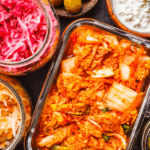If you’re committed to a vegan lifestyle, whether for ethics, health, or the planet, you likely take deliberate steps with every meal. But here’s the truth: eliminating animal products alone isn’t enough. Without proper planning and supplementation, many vegans unintentionally miss one critical nutrient: Vitamin B-12. And that oversight? It can sabotage your health in ways you won’t notice until it’s too late.
The One Nutrient Most Vegans Miss: Vitamin B-12
If there’s one critical nutrient that even the most well-intentioned vegan might overlook, it’s Vitamin B-12. And unfortunately, this small but mighty vitamin isn’t optional, your body can’t produce it on its own, and it plays a vital role in keeping your brain, nerves, and blood cells functioning properly.1
Vitamin B-12, or cobalamin, is essential for:
- Producing red blood cells
- Supporting proper nerve function
- Making DNA and other genetic material
- Aiding in energy production and metabolism
A deficiency doesn’t just leave you feeling a bit tired. Over time, low levels of Vitamin B-12 can cause pernicious anemia, irreversible nerve damage, depression, confusion, balance problems, and even symptoms that mimic dementia.1
What makes this especially tricky is that early signs of B-12 deficiency are subtle: think fatigue, irritability, poor concentration, or tingling in the hands and feet. Left unchecked, though, this deficiency can progress silently and become much harder to correct. One study found that up to 80% of vegans not taking a supplement were either deficient or on the edge of deficiency.1
That’s because Vitamin B-12 is found almost exclusively in animal products, meat, fish, eggs, dairy, meaning it’s virtually absent from plant-based diets unless it’s added through fortification.1
Why Vegans Are Especially at Risk
Unlike other essentials like vitamin C or iron, B-12 is not found in plant foods, unless fortified. Human bodies can’t produce it; we get it through animal foods or supplements. Studies show that between 40% and 80% of vegans who don’t supplement become deficient over time, sometimes within just a few years.1 Fortified foods can help, but many aren’t consuming enough.1
This means B-12 supplementation is non-negotiable if you’re following a vegan diet.
So What Should You Do?
Fortunately, getting adequate B-12 is straightforward with a little planning. Many plant-based milks, cereals, and nutritional yeast are fortified with this essential vitamin. Supplementation is another reliable option—you can choose either daily low doses of 25–100 mcg or weekly higher doses of 1,000 mcg, with both cyanocobalamin and methylcobalamin being effective forms.2
If you’re considering supplements, it’s smart to have your doctor monitor your B-12 levels periodically. This is especially important if you’re pregnant, breastfeeding, or managing any underlying health conditions.2
Rather than viewing B-12 as an obstacle to plant-based eating, think of it as simply another aspect of mindful nutrition planning. With this proactive approach, you can confidently pursue your vegan goals while safeguarding your long-term neurological and cardiovascular health.
Other Nutrients to Watch
While B-12 is the most critical, other nutrients and vitamins also deserve your attention:
- Iron: Plant-based iron is non-heme, less absorbable than iron from meat. Pair with vitamin C-rich foods and avoid coffee or tea at meals to increase absorption.3
- Calcium & Vitamin D: Needed for bone health. Rely on fortified plant milks, leafy greens, and consider D or calcium supplements, especially in low-sun exposure.3
- Zinc & Iodine: Phytates in grains/legumes can inhibit absorption. Consider seaweed, iodized salt, nuts, seeds, or supplement as needed.3
- Omega-3 (EPA/DHA): ALA sources (chia, flax) are helpful but not efficient—most vegans benefit from a microalgae-based DHA/EPA supplement to support inflammation control and brain health.3
How Not to Sabotage Your Vegan Diet
If there’s one key takeaway from this article, it’s this: don’t leave your vitamin B-12 intake to chance. Supplement regularly, eat fortified foods, and stay proactive about your health.
Here’s how to protect your body and your plant-based goals.
1. Make Fortified Foods a Daily Habit
Many everyday plant-based items are fortified with B-12, meaning the vitamin has been added during production.4 Look for it in:
- Plant milks like soy, almond, or oat (check the label for B-12)
- Nutritional yeast (a cheesy-tasting vegan favorite)
- Fortified cereals and meat alternatives
Consuming a few servings of these foods daily can help maintain baseline levels, especially if you’re not supplementing.
2. Choose a High-Quality Supplement
Because diet alone may not be enough, most experts recommend taking a dedicated B-12 supplement. 4 Look for forms like:
- Methylcobalamin (a naturally occurring form)
- Cyanocobalamin (a stable and well-researched synthetic form)
Dosing can vary, but two options are generally effective:4
- Daily doses of 25–100 micrograms (µg)
- Weekly doses of 1,000 µg or more
Talk to your healthcare provider about what’s best for you, especially if you’re pregnant, breastfeeding, or managing another health condition.
3. Don’t Skip the Bloodwork
Even with the best intentions, it’s possible to be low on B-12 without knowing it. That’s why your annual checkup and bloodwork is essential.5 Ask your provider to check:
- Serum B-12 levels (basic screening)
- Methylmalonic acid (MMA) levels (a more sensitive indicator of deficiency)
These tests can help catch issues early, before symptoms begin or damage occurs.
4. Be Cautious with Multivitamins
Many vegan multivitamins contain small amounts of B-12, but not always enough to meet your needs.4 If you’re relying on one, double-check the dosage. You might still need a separate B-12 supplement to stay in the safe zone.
Reconnect with Your “Why” as a Motivator
Why did you choose veganism? Health, ethics, planet, spirituality or all of those? Remembering your motivation helps when the details feel overwhelming. If your diet isn’t delivering energy, mental clarity, or strength—adjust it. A well-planned vegan diet can support vibrant health, but it requires awareness and action.
Conclusion
The most common, and avoidable, mistake among vegans is ignoring Vitamin B-12. This nutrient isn’t optional; it’s essential. Without it, subclinical deficiencies can erode your health slowly and silently. But with intentional planning, supplementation, and periodic testing, you can continue thriving on a plant-based diet with strength, clarity, and vitality.
Before making any changes, or if you notice fatigue or mental fog, ask your healthcare provider about checking your B-12 status. And keep nourishing your values with informed, empowered choices.
References:
- Niklewicz, A., Smith, A. D., Smith, A., Holzer, A., & Klein, A. (2022). The importance of vitamin B12 for individuals choosing plant-based diets. European Journal of Nutrition. doi: 10.1007/s00394-022-03025-4
- Richards, L. (2023, June). Vitamin B12: The Ultimate Guide For Vegans And Vegetarians. Retrieved from Plant Based News: https://plantbasednews.org/lifestyle/vitamin-b12-folate-anemia-vegans-supplements/
- IFIC. (2023, February 23). International Food Information Council. Retrieved from Six Critical Nutrients for Healthy Vegan Eating: https://ific.org/resources/articles/6-nutrients-vegans-might-not-be-getting-enough-of/
- NHS. (2022, May). National Health Service. Retrieved from The vegan diet: https://www.nhs.uk/live-well/eat-well/how-to-eat-a-balanced-diet/the-vegan-diet/
- Cleveland Clinic. (2024, August 1). Vitamin B12 Deficiency. Retrieved from Cleveland Clinic: https://my.clevelandclinic.org/health/diseases/22831-vitamin-b12-deficiency








